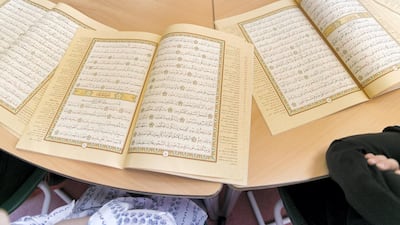Surrounded by girls almost twice her age, Hanan Saleem, 7, recites the Quran flawlessly. Her intonation pitches up at just the right moment and her rhythm is perfect – not bad for a girl who does not speak Arabic
Hanan is British and, although she does not speak the language, she can read the Quran. She began memorising the holy book when she was little more than a year old and can now recite 13 of the 30 sections by heart.
"My mother started to teach me when I was 14 months old," Hanan says. "We had a phone with an app, and from that phone I learnt the recitation of Mashari Al Afasi [a renowned Quran reciter]."
She learnt by working with a teacher who taught her to read the Quran.
She can now recite Quran for up to four minutes at a time while applying tajweed.
Elocution when reading the Quran is referred to as tajweed. It is preferred, but not obligatory, when reciting the holy text.
Hanan memorises between one and two pages of the Quran a day, "and no, I don't take a break at the weekend", she says.
The youngest in her class at Al Bateen Quran Memorisation Centre but Hanan is not the only non-Arabic speaker there.
Sisters Aysha and Khadeeja Abdullateef, from India, have been reciting the Quran since they were two years old.
"We both know how to read the whole Quran, but we started memorising a little," Aysha says. "We had an Arabic instructor since we were children, who used to teach us Arabic letters and slowly we started studying the Quran.
“Now we read the Quran every day after sunset and after morning prayers. We know Yaseen and Tabarak chapters, but it is difficult to memorise that much.”
_______________
Read more:
Abu Dhabi student goes from being unable to speak Arabic to winning Quran Memorisation Award
FNC approves rules to supervise Quran centres
_______________
Khadeeja, 14, says she is now studying the 29th section of the Quran – also known as Tabarak.
“I study less and less every day because I cannot memorise a lot, but we try to revise everything we have learnt day by day.”
Their teacher, Hanan Hanafi, explains to the class in English how to implement ekhfa, a recitation rule that involves hiding the letter while pronouncing the word.
"To teach non-Arabs, one must first master the English language to deliver the information," she says. She uses a combination of technology and books to teach her pupils.
Mrs Hanafi pulls out her mirror and explains that, when she pronounces a letter that non-Arabs usually cannot pronounce, she gives the pupil a mirror so she can imitate the movements of her mouth.
“When I talk I let her see my articulation, and then she looks in the mirror so she can copy me and to see how the pronunciation is done inside the mouth.”
Next, she opens her picture book, which contains diagrams of the tongue and jaw, so she can point out where each letter comes from.
While she does most of the explanation in English, she deliberately writes the notes on the board in Arabic.
“Because when they see the text in the Quran it will be in Arabic, so they should get used to it.”


